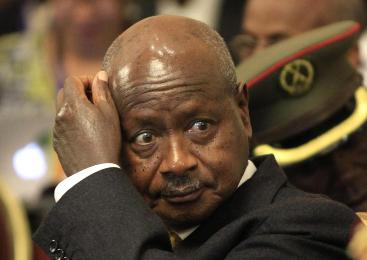Museveni dismisses Kiir’s claims coup attempt sparked conflict
June 11, 2014 (ADDIS ABABA) – Ugandan president Yoweri Museveni whose forces are helping the South Sudanese government fighting against the rebels has admitted for the first time that no coup attempt had occurred in Juba, saying what caused the crisis in mid-December was simply a fighting between presidential guards.

“President Museveni admitted that there was no coup attempt and I congratulated him for that,” Machar told Sudan Tribune on Thursday.
He said the Ugandan leader made the confession during a hot debate involving him [Machar] and president Kiir in the presence of the regional leaders on what transpired in Juba on 15 December, adding the South Sudanese leader did not react to Museveni’s new interpretation or position.
The Ugandan president instead agreed that the fighting merely started between the presidential guards and was not a coup.
Observers say Museveni’s change of mind in the interpretation of what sparked the current six-month old crisis did not come as a surprise to the many of the regional leaders present as they in the past dismissed the coup attempt narrative with the exception of the Ugandan leader who tried to sell it in vain.
Fighting erupted when president Salva Kiir allegedly ordered the presidential guards commander to disarm ethnically Nuer soldiers among the guards, sparking the violence and massacre of thousands of Machar’s Nuer civilians in the capital.
The rebels directly accused the president of fabricating the story of a coup attempt in order to get rid of political reformists within the ruling party (SPLM) as well as “administered” the massacre of the civilians in Juba.
Kiir accused his former deputy, Machar, of standing behind plotting a coup along with others.
The ex-VP said Ugandan forces were deployed around Juba on 13 December, two days before eruption of the violence, arguing that the early deployment indicated there was a plan to initiate violence amid heated debates within the ruling party (SPLM) on the future of the party leadership.
On 6 December, Machar and his colleagues at the party leadership held a press conference in Juba and accused president Kiir of “dictatorial tendencies” in reluctance to allow democratic political reforms to take shape.
Uganda has since got involved in the internal fighting and refused to withdraw its forces despite the 23 January Cessation of Hostilities Agreement signed by the two warring parties to pull out foreign forces.
The rebel leader however said during a face-to-face meeting with Museveni and Kiir in Addis Ababa on Tuesday the Ugandan leader voiced his willingness to pull out his troops.
The rebels said they welcomed the direct negotiations with Museveni on withdrawal of his forces, adding that he was the main speaker negotiating on behalf of president Salva Kiir, his ally in the war.
The violence has claimed tens of thousands of lives and displaced over a million others since the violent conflict erupted in December last year.
The two parties have verbally agreed on the sidelines of the IGAD summit in Addis Ababa on Tuesday to negotiate a peace agreement and form a transitional government of national unity within the coming 60 days.
(ST)
